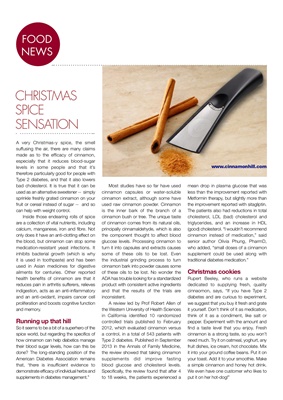
FOOD
NEWS
A very Christmas-y spice, the smell
suffusing the air, there are many claims
made as to the efficacy of cinnamon,
especially that it reduces blood-sugar
levels in some people and that it's
therefore particularly good for people with
Type 2 diabetes, and that it also lowers
bad cholesterol. It is true that it can be
used as an alternative sweetener -- simply
sprinkle freshly grated cinnamon on your
fruit or cereal instead of sugar -- and so
can help with weight control.
Inside those endearing rolls of spice
are a collection of vital nutrients, including
calcium, manganese, iron and fibre. Not
only does it have an anti-clotting effect on
the blood, but cinnamon can stop some
medication-resistant yeast infections. It
inhibits bacterial growth (which is why
it is used in toothpaste) and has been
used in Asian medicines for digestive
ailments for centuries. Other reported
health benefits of cinnamon are that it
reduces pain in arthritis sufferers, relieves
indigestion, acts as an anti-inflammatory
and an anti-oxidant, impairs cancer cell
proliferation and boosts cognitive function
and memory.
Running up that hill
So it seems to be a bit of a superhero of the
spice world, but regarding the specifics of
how cinnamon can help diabetics manage
their blood sugar levels, how can this be
done? The long-standing position of the
American Diabetes Association remains
that, 'there is insufficient evidence to
demonstrate efficacy of individual herbs and
supplements in diabetes management."
CHRISTMAS
SPICE
SENSATION
Most studies have so far have used
cinnamon capsules or water-soluble
cinnamon extract, although some have
used raw cinnamon powder. Cinnamon
is the inner bark of the branch of a
cinnamon bush or tree. The unique taste
of cinnamon comes from its natural oils,
principally cinnamaldehyde, which is also
the component thought to affect blood
glucose levels. Processing cinnamon to
turn it into capsules and extracts causes
some of these oils to be lost. Even
the industrial grinding process to turn
cinnamon bark into powder causes some
of these oils to be lost. No wonder the
ADA has trouble looking for a standardized
product with consistent active ingredients
and that the results of the trials are
inconsistent.
A review led by Prof Robert Allen of
the Western University of Health Sciences
in California identified 10 randomized
controlled trials published to February
2012, which evaluated cinnamon versus
a control, in a total of 543 patients with
Type 2 diabetes. Published in September
2013 in the Annals of Family Medicine,
the review showed that taking cinnamon
supplements did improve fasting
blood glucose and cholesterol levels.
Specifically, the review found that after 4
to 18 weeks, the patients experienced a
mean drop in plasma glucose that was
less than the improvement reported with
Metformin therapy, but slightly more than
the improvement reported with sitagliptin.
The patients also had reductions in total
cholesterol, LDL (bad) cholesterol and
triglycerides, and an increase in HDL
(good) cholesterol. "I wouldn't recommend
cinnamon instead of medication," said
senior author Olivia Phung, PharmD,
who added, "small doses of a cinnamon
supplement could be used along with
traditional diabetes medication."
Christmas cookies
Rupert Beeley, who runs a website
dedicated to supplying fresh, quality
cinnaomon, says, "If you have Type 2
diabetes and are curious to experiment,
we suggest that you buy it fresh and grate
it yourself. Don't think of it as medication,
think of it as a condiment, like salt or
pepper. Experiment with the amount and
find a taste level that you enjoy. Fresh
cinnamon is a strong taste, so you won't
need much. Try it on oatmeal, yoghurt, any
fruit dishes, ice cream, hot chocolate. Mix
it into your ground coffee beans. Put it on
your toast. Add it to your smoothie. Make
a simple cinnamon and honey hot drink.
We even have one customer who likes to
put it on her hot-dog!"
www.cinnamonhill.com